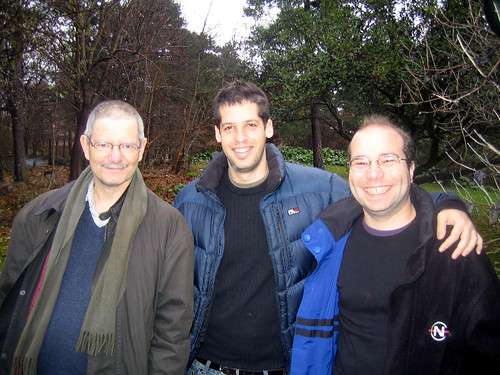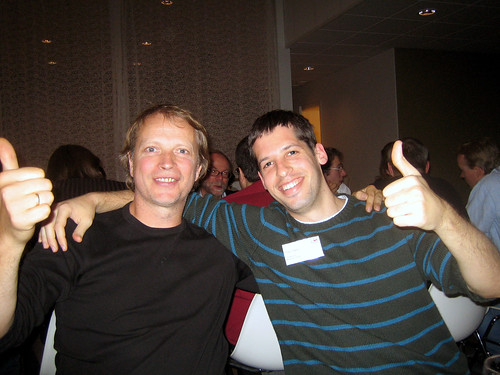I'm here in Barcelona, where I will stay for a few more days until the end of my trip. I've had a great time, but I can't wait to get back home. It feels like it's time to go back to regular life.
I started in Stockholm, then I went to Copenhagen, Paris, Lyon, Granada, Seville and Barcelona. I spent a few days in most of these cities, where I mostly did a lot of walking around and sight-seeing. I visited a few museums, but I didn't want to spend too much time in museums because I tend to enjoy more wandering around the streets of a new city, soaking in their sights, smells, and sounds.
Seeing a number of artistic creations that are generally regarded as masterpieces has led me to think about where great software stands in the realm of creative endeavors. As in most fields, some software is great and some isn't, but how come most people don't value great software in the same way that they value great music, paintings or architecture? This question can be discussed in great lengths, but I think the answer boils down to the following points: software can only be understood by programmers -- to non-programmers, all code looks like the same gibberish (much code looks like gibberish to coders as well :) ); software is always utilitarian -- practically all software is written as a means to an end, not an an end in itself; software stimulates the left brain exclusively -- it doesn't trigger a gut reaction like other art forms because its appreciation always requires analytical thinking; most people don't care about how an application or a software library is written -- they just want it to work.
So, maybe great software will never be regarded as art, but I think most people would agree that software development is a craft that requires skill and creativity. In addition, all programmers would agree that some code is beautiful and some isn't. I think the field that resembles software the most in the way we regard its creations isn't sculpture, painting, or music, but math. Like software, math is arcane, complex, logical, and most of it is boring, but many mathematical proofs are among the greatest achievements of our civilization.
Ok, enough philosophising -- let's get back to my travels :)
I went on this trip because I had a strong itch to see more of Europe. It's safe to say that this desire is now quite satisfied. By the last week or so of my trip, I had actually gotten pretty tired of traveling. Although the cities I've visited have plenty of unique charm, visiting a sequence of cities for a few days each ends up feeling repetitive. It would probably be more rewarding to stay in one place for a longer time period, where I would get a richer exposure to the local language and culture. But then again, 3.5 weeks probably isn't enough time for a profound cultural experience, anyway. I would have to stay in a foreign country for at least a few months in order to learn the local language and feel a stronger connection to the place and its people.
(It may even require a longer period to make proper Cultural Learnings of Europe for Make Benefit Glorious Nation of U, S and A : ) )
I actually think I've had my fix of city traveling for a while. Looking back at my trips, I have enjoyed nature vacations more than anything, and there are plenty of natural treasures nearby, including many of the US national parks, that I haven't yet visited. Next time, I will try to plan a nice nature adventure.
When I get back home, I will have to plan the next phase of my career. I have a number of ideas for cool Erlang apps, and also a few offers for different kinds of gigs, but I haven't picked a concrete direction yet. I will certainly keep working on ErlyWeb (there are a number of small improvements I will make as soon as I get home), but I think ErlyWeb is quite good as it is and I don't want it to make it bloated by adding too many features to it. (One aspect of ErlyWeb that could definitely use some work is support for additional database drivers in ErlyDB, but I will probably let other developers lead this effort because I don't have a strong need for other drivers right now.) I will also try to build at least one of the apps I have thought up and see how far I can take it. If all goes well, it will become the next YouTube. If not, I hope it will at least merit a line or two on my resume :)
Boston, get ready to make room for one more person :)
Monday, November 27, 2006
Monday, November 13, 2006
Saturday, November 11, 2006
12th Erlang User Conference
Here I am at Stockholm, Sweden, blogging a day after the 12th International Erlang User Conference.
I had a blast.
I arrived here a few days ago after a long journey from Boston via Paris. A few days before I left, Joe Armstrong generously offered to host me. Accepting the invitation couldn't have been any easier -- I don't get to stay very often for 3 days with the creator of my favorite programming language :).
Spending time with Joe was great. We had many interesting conversations about Erlang, computer science, culture, business, politics, design, and life. It was a rare opportunity to befriend someone who has accomplished so much and who has such a wealth of knowledge and ideas about the fields in which I'm most interested.
Joe is passionate about concurrent programming and the design of fault tolerant systems. This is how he summarized the main ideas behind Erlang (I'm probably paraphrasing): "To build a fault tolerant system, you need at least two computers. Why? Because one of them can crash. If you have more than one computer, you need distributed programming. Distributed applications run in different threads, and therefore concurrency is an integral part of fault tolerant systems."
Many of the presentations were very interesting, but the best part (at least for me) was meeting all the Erlangers I knew only from email correspondence, among whom are Claes (Klacke) Wikstrom, Mickael Remond (the founder of Process One), Ulf Wiger, Robert Virding and many others.
Everyone I met was very friendly, intelligent, down-to-earth, and had a healthy sense of humor. They all love programming in Erlang.
I had a great time chatting with Klacke. Klacke has had one of the most impressive careers of anyone I've ever met. He's created Mnesia, Yaws, distributed Erlang, and many parts of the Erlang emulator. He's also one of the people behind Bluetail, Kreditor, and now tail-f. Klacke constantly comes up with great quotes. Here are a couple of good ones as I remember them: "It feels like I have a sharp knife in my pocket, and other people have a blunt one", "Some problems you can't imagine solving if you don't have the right tools".
I also enjoyed talking with Ulf Wiger, who has developed with Joe Armstrong a very interesting framework for cooperative web development in Erlang called Erlhive. Maybe we will have opportunities for collaboration somwhere down the road.
Finally, I had a nice tour of Stockholm today (but too bad it rained). It's a beautiful city. I walked around the old town and I also visited the Vasa museum, whose exhibit is an impressive warship from the 1600's that capsized due to an engineering blunder: to please the the King's whims, the engineers loaded the ship with too many canons. Due to the excess weight at the top of the ship, it had several glorious minutes of sailing before it sank in the Stockholm harbour. Oops.
I would like to write in more detail, but my jetlag is starting to wear thin and I have to get some sleep as I'm flying to Copenhagen tomorrow. After that, I'm travelling for 3 weeks in Europe, visiting Amsterdam, Paris, Lyon, the south of France, and Spain (mostly Barcelona).
I'll end this posting with few pictures I've taken:

Me, Joe and Mickael Remond

Me and Klacke, A.K.A the Erlang Open Source Web Squad. Our weapons: Erlang, Yaws and ErlyWeb. Our mission: to end web development suckage, one webapp at a time :)
I had a blast.
I arrived here a few days ago after a long journey from Boston via Paris. A few days before I left, Joe Armstrong generously offered to host me. Accepting the invitation couldn't have been any easier -- I don't get to stay very often for 3 days with the creator of my favorite programming language :).
Spending time with Joe was great. We had many interesting conversations about Erlang, computer science, culture, business, politics, design, and life. It was a rare opportunity to befriend someone who has accomplished so much and who has such a wealth of knowledge and ideas about the fields in which I'm most interested.
Joe is passionate about concurrent programming and the design of fault tolerant systems. This is how he summarized the main ideas behind Erlang (I'm probably paraphrasing): "To build a fault tolerant system, you need at least two computers. Why? Because one of them can crash. If you have more than one computer, you need distributed programming. Distributed applications run in different threads, and therefore concurrency is an integral part of fault tolerant systems."
Many of the presentations were very interesting, but the best part (at least for me) was meeting all the Erlangers I knew only from email correspondence, among whom are Claes (Klacke) Wikstrom, Mickael Remond (the founder of Process One), Ulf Wiger, Robert Virding and many others.
Everyone I met was very friendly, intelligent, down-to-earth, and had a healthy sense of humor. They all love programming in Erlang.
I had a great time chatting with Klacke. Klacke has had one of the most impressive careers of anyone I've ever met. He's created Mnesia, Yaws, distributed Erlang, and many parts of the Erlang emulator. He's also one of the people behind Bluetail, Kreditor, and now tail-f. Klacke constantly comes up with great quotes. Here are a couple of good ones as I remember them: "It feels like I have a sharp knife in my pocket, and other people have a blunt one", "Some problems you can't imagine solving if you don't have the right tools".
I also enjoyed talking with Ulf Wiger, who has developed with Joe Armstrong a very interesting framework for cooperative web development in Erlang called Erlhive. Maybe we will have opportunities for collaboration somwhere down the road.
Finally, I had a nice tour of Stockholm today (but too bad it rained). It's a beautiful city. I walked around the old town and I also visited the Vasa museum, whose exhibit is an impressive warship from the 1600's that capsized due to an engineering blunder: to please the the King's whims, the engineers loaded the ship with too many canons. Due to the excess weight at the top of the ship, it had several glorious minutes of sailing before it sank in the Stockholm harbour. Oops.
I would like to write in more detail, but my jetlag is starting to wear thin and I have to get some sleep as I'm flying to Copenhagen tomorrow. After that, I'm travelling for 3 weeks in Europe, visiting Amsterdam, Paris, Lyon, the south of France, and Spain (mostly Barcelona).
I'll end this posting with few pictures I've taken:

Me, Joe and Mickael Remond

Me and Klacke, A.K.A the Erlang Open Source Web Squad. Our weapons: Erlang, Yaws and ErlyWeb. Our mission: to end web development suckage, one webapp at a time :)
Friday, November 03, 2006
ErlyWeb + Yaws 1.64
Some people have had trouble running ErlyWeb on Yaws 1.64. This is because the Yaws 'arg' record has changed. I created a Yaws 1.64 compatible yaws_arg.beam file that you can download here. If you're running Yaws 1.64, drop this file in place of the existing yaws_arg.beam in in your 'erlyweb-0.x/ebin' directory, give it another try, and let me know if it helped.
Thursday, November 02, 2006
New ErlyWeb Google Group
Following the suggestion of one of my readers, I created a Google group for ErlyWeb hackers. You can join it to ask questions, share points of view, help each other out, make suggestions, and announce the launch of the killer ErlyWeb app you're building :)
Here's the link: http://groups.google.com/group/erlyweb
From now on, I will make all announcements about new releases in this group rather than on my blog.
Here's the link: http://groups.google.com/group/erlyweb
From now on, I will make all announcements about new releases in this group rather than on my blog.
ErlyWeb 0.2
I made some improvements to the first release of ErlyWeb, some based on user feedback, and some based on my own whims :) This is what I did:
- Chaged the LastCompileTime parameter in erlyweb:compile into an option value in the form of {last_compile_time, Time}.
- Added the following options to erlyweb:compile/2:
{auto_compile, true} : this option, useful during development, tells ErlyWeb to compile all files that have changed since the last request when a new request arrives. This frees you from having to call erlyweb:compile every time you make a code change in your app. Just don't forget to turn auto-compilation off by calling erlyweb:compile without the {auto_compile, true} option when you are switching from development to production mode, because auto-compilation slows things down.
Update (12/6/06): The pre_compile_hook and post_compile_hook have changed in ErlyWeb v0.3. Read this announcement for more details.
{pre_compile_hook, {Module, FuncName}} and {post_compile_hook, {Module, FuncName}}: these option tell ErlyWeb to call the predefined functions before/after (auto)compilation. This allows you to extend the compilation process in an arbitrary way, e.g. by compiling additional files that are outside of the application's src directory. Both functions take a single parameter which is the time of the last compilation (or 'undefined' if the time is not available). For example, let's say you have the following file called 'compile_hooks.erl' in the 'src' directory:
You could use the new compilation options as follows:
From now on, every time ErlyWeb does an auto-compilation, it will call those hooks, passing into them the time of the last compilation (or 'undefined' on the first compilation).
- Changed the include directive in yaws_arg.erl from '-include("yaws/include/yaws_api.hrl").' to '-include("yaws_api.hrl").' (this removes assumptions about your Yaws path structure).
- Changed the docroot directive in yaws from pointing at the application's base directory to [base]/www. E.g., if your previous docroot line was
docroot = /apps/music
it should now be
docroot = /apps/music/www
(there's no change in behavior -- it just makes the configuration more explicit).
That's it :)
Note: a few people have asked me whether ErlyWeb requires a MySQL database. The answer is 'no.' You can use ErlyWeb without any database backend. Just don't keep the source files for any models in src/components, and then you'll never even have to call erlydb:start().
In a minute, I'll put the new zip file on erlyweb.org so you can download it all in one shot.
- Chaged the LastCompileTime parameter in erlyweb:compile into an option value in the form of {last_compile_time, Time}.
- Added the following options to erlyweb:compile/2:
{auto_compile, true} : this option, useful during development, tells ErlyWeb to compile all files that have changed since the last request when a new request arrives. This frees you from having to call erlyweb:compile every time you make a code change in your app. Just don't forget to turn auto-compilation off by calling erlyweb:compile without the {auto_compile, true} option when you are switching from development to production mode, because auto-compilation slows things down.
Update (12/6/06): The pre_compile_hook and post_compile_hook have changed in ErlyWeb v0.3. Read this announcement for more details.
{pre_compile_hook, {Module, FuncName}} and {post_compile_hook, {Module, FuncName}}: these option tell ErlyWeb to call the predefined functions before/after (auto)compilation. This allows you to extend the compilation process in an arbitrary way, e.g. by compiling additional files that are outside of the application's src directory. Both functions take a single parameter which is the time of the last compilation (or 'undefined' if the time is not available). For example, let's say you have the following file called 'compile_hooks.erl' in the 'src' directory:
-module(compile_hooks).
-compile(export_all).
pre_compile(LastCompileTime) ->
io:format("pre-compile (last: ~p) ~n", [LastCompileTime]).
post_compile(LastCompileTime) ->
io:format("post-compile (last: ~p) ~n", [LastCompileTime]).
You could use the new compilation options as follows:
erlyweb:compile("/path/to/app",
[{erlydb_driver, mysql},
{auto_compile, true},
{pre_compile_hook, {compile_hooks, pre_compile}},
{post_compile_hook, {compile_hooks, post_compile}}]).
From now on, every time ErlyWeb does an auto-compilation, it will call those hooks, passing into them the time of the last compilation (or 'undefined' on the first compilation).
- Changed the include directive in yaws_arg.erl from '-include("yaws/include/yaws_api.hrl").' to '-include("yaws_api.hrl").' (this removes assumptions about your Yaws path structure).
- Changed the docroot directive in yaws from pointing at the application's base directory to [base]/www. E.g., if your previous docroot line was
docroot = /apps/music
it should now be
docroot = /apps/music/www
(there's no change in behavior -- it just makes the configuration more explicit).
That's it :)
Note: a few people have asked me whether ErlyWeb requires a MySQL database. The answer is 'no.' You can use ErlyWeb without any database backend. Just don't keep the source files for any models in src/components, and then you'll never even have to call erlydb:start().
In a minute, I'll put the new zip file on erlyweb.org so you can download it all in one shot.
Wednesday, November 01, 2006
Goodbye, Typo. Hello Wordpress!
Update (12/21/06): I was in a pretty upset state of mind after struggling with a barely-working comment system for many days when I wrote this posting. I didn't want to take my frustrations out on Typo because I liked Typo (plus, I really didn't think this was Typo's fault because Typo worked fine under light load), so I picked on Rails instead. Please read this posting as a silly angry rant rather than a well thought-out criticism.
It wouldn't be fair to judge the venerable Ruby on Rails "platform" based on a single data point (*cough* it sucks! *cough* *cough*), but after days of agony trying to get comment submission to work properly in Typo (executing an INSERT after an HTTP POST must be a requirement that's outside of Rails' "scope"), I decided to go back to my roots and run this blog on Wordpress.
(Yes, I was tempted to write my own blogging engine in Erlang, but I decided against it -- I must keep my eyes on the prize :) )
Based on my admittedly limited Rails experience, even if Erlang isn't your cup of tea, I recommend avoiding Rails and sticking to PHP or Python (or Smalltalk, about which I hear nice things) unless you're an optimization genius who loves the thrill of Linux tinkering; you're hopelessly stricken by a successful marketing blitz; you're a masochist; you wrote a Rails book; or you're just not planning on success.
I can't comprehend why some people think it's justifiable to ask someone how many worker processes he would like to run. I wouldn't want to pick a low number like, say, 5, because that might indicate that I have self esteem issues, but then I'm trapped by the fear than an astronomically high number such as, gosh, 20, would hose my VPS.
Sometimes, when I let my imagination run wild, I wish I could say something crazy, like "500,000".
Oh wait -- I can :)
Update (11/2): Wow! Wordpress is so much faster than Typo! Good job, Matt! :)
It wouldn't be fair to judge the venerable Ruby on Rails "platform" based on a single data point (*cough* it sucks! *cough* *cough*), but after days of agony trying to get comment submission to work properly in Typo (executing an INSERT after an HTTP POST must be a requirement that's outside of Rails' "scope"), I decided to go back to my roots and run this blog on Wordpress.
(Yes, I was tempted to write my own blogging engine in Erlang, but I decided against it -- I must keep my eyes on the prize :) )
Based on my admittedly limited Rails experience, even if Erlang isn't your cup of tea, I recommend avoiding Rails and sticking to PHP or Python (or Smalltalk, about which I hear nice things) unless you're an optimization genius who loves the thrill of Linux tinkering; you're hopelessly stricken by a successful marketing blitz; you're a masochist; you wrote a Rails book; or you're just not planning on success.
I can't comprehend why some people think it's justifiable to ask someone how many worker processes he would like to run. I wouldn't want to pick a low number like, say, 5, because that might indicate that I have self esteem issues, but then I'm trapped by the fear than an astronomically high number such as, gosh, 20, would hose my VPS.
Sometimes, when I let my imagination run wild, I wish I could say something crazy, like "500,000".
Oh wait -- I can :)
Update (11/2): Wow! Wordpress is so much faster than Typo! Good job, Matt! :)
Subscribe to:
Posts (Atom)

